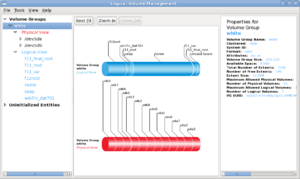Difference between revisions of "User:Chris Tyler/draft/ops235lab"
Chris Tyler (talk | contribs) (→Investigation 1: How are LVMs managed using system-config-lvm?) |
Chris Tyler (talk | contribs) (→Investigation 1: How are LVMs managed using system-config-lvm?) |
||
| Line 66: | Line 66: | ||
=== Investigation 1: How are LVMs managed using system-config-lvm? === | === Investigation 1: How are LVMs managed using system-config-lvm? === | ||
| + | '''Perform this investigation on the VM named ''fedora2''.''' | ||
[[Image:Ops235_lab4_1.png|thumb|right|Screenshot of system-config-lvm in Fedora 12. Click to enlarge.]] | [[Image:Ops235_lab4_1.png|thumb|right|Screenshot of system-config-lvm in Fedora 12. Click to enlarge.]] | ||
# Fedora provides a tool called <code>system-config-lvm</code> to graphically administer LVM. It will appear on the menu as System>Administration>Logical Volume Management. Verify that this package is present, and install it if required. | # Fedora provides a tool called <code>system-config-lvm</code> to graphically administer LVM. It will appear on the menu as System>Administration>Logical Volume Management. Verify that this package is present, and install it if required. | ||
Revision as of 07:36, 2 February 2010
Contents
State when starting Lab 4
When you are done Lab 4 you should have the following disk storage setup:
- fedora1
This VM has a GUI and no free space in the VG. VG #PV #LV #SN Attr VSize VFree vg_fedora1 1 2 0 wz--n- 9.80G 0 LV VG Attr LSize lv_root vg_fedora1 -wi-ao 8.83G lv_swap vg_fedora1 -wi-ao 992.00M PV VG Fmt Attr PSize PFree /dev/vda2 vg_fedora1 lvm2 a- 9.80G 0
- fedora2
This VM has a GUI and free space in the VG. VG #PV #LV #SN Attr VSize VFree vg_fedora2 1 3 0 wz--n- 9.80G 3.95G LV VG Attr LSize lv_home vg_fedora2 -wi-ao 1000.00M lv_root vg_fedora2 -wi-ao 3.91G lv_swap vg_fedora2 -wi-ao 992.00M PV VG Fmt Attr PSize PFree /dev/vda2 vg_fedora2 lvm2 a- 9.80G 3.95G
- fedora3
This VM has no GUI installed. VG #PV #LV #SN Attr VSize VFree vg_fedora3 1 3 0 wz--n- 9.80G 3.83G LV VG Attr LSize lv_home vg_fedora3 -wi-ao 1.00G lv_root vg_fedora3 -wi-ao 4.00G lv_swap vg_fedora3 -wi-ao 992.00M PV VG Fmt Attr PSize PFree /dev/vda2 vg_fedora3 lvm2 a- 9.80G 3.83G
- host (disk pack)
Four PVs, minimum VG size 60G Single filesystem on vg_main/root, size 50G At least 10G available space in VG 20% of disk space unallocated to any partition (min 15G)
Logical Volume Management
Resources
Please read this page to get an overview of LVM:
Investigation 1: How are LVMs managed using system-config-lvm?
Perform this investigation on the VM named fedora2.
- Fedora provides a tool called
system-config-lvmto graphically administer LVM. It will appear on the menu as System>Administration>Logical Volume Management. Verify that this package is present, and install it if required. - Use this tool to determine the current LVM configuration by clicking on the appropriate element and reading the properties in the right-hand panel -- write down the answers:
- What are the names and sizes of the PVs?
- What is the name and size of the VG?
- What are the names and sizes of the LVs?
- Is there any space in the VG which is not allocated to a LV?
- Increase the size of the home filesystem to 2 GB:
- Click on the LV containing the home filesystem.
- Click on Edit Properties.
- Change the size to 2 GB and click Ok.
- Create a new 2G LV containing an ext4 filesystem named lv_archive and mount it at /archive
- Click on Logical View.
- Click the Create New Logical Volume.
- Set the name, size, filesystem, and mount point.
- Click Ok.
- Backup
/etcinto/archive
- Copy the files in /etc into the filesystem mounted at
/archive(use the graphical tools or the command line. If using cp, remember to use the -R option).
- Copy the files in /etc into the filesystem mounted at
- Shrink the size of
lv_archiveto 1 GB. - Try shrinking
/-- what happens? Why?
Investigation 2: How are LVMs managed from the command line?
- Repeat the operations from Investigation 1, using fedora3 (command-line tools only):
- Determine the current LVM configuration.
- Grow the home filesystem to 2G (lvextend, resize2fs)
- Create a new 2G LV containing an ext4 filesystem and mount it at /archive (lvcreate, mkfs, mount, edit fstab, reboot to confirm automatic mount)
- Backup /etc into /archive
- Shrink lv_archive to 1G (umount, resize2fs, lvreduce, resize2fs, mount)
- Try shrinking / and observe that it is not permitted
Investigation 3: How can a PV be added to an existing VG?
- Provision fedora1 with an additional 5G virtual disk
- Add that virtual disk to the existing volume group
- Create lv_home (1G), and migrate /home onto it (lvcreate, mkfs, mount, mv, rm, umount, edit fstab, mount)
Investigation 4: How can I use LVM to manage storage on my disk pack?
- This investigation will have less-detailed instructions -- they students should be able to apply and adapt what they learned in the first three investigations.
- On the host (disk pack):
- Create a new logical partition (minimum 5G, leaving at least 10G free space in the extended partition)
- Add that partition as a PV into the existing VG
- Grow the root filesystem to fill the available space (this will provide sufficient space for Investigation 5)
Package Management
- Keep existing content.
User/Group Management
- Keep existing content, add a requirement to create their Matrix user on fedora3 (forcing use of command-line tools).
